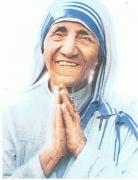Mother TERESA
Mutter Teresa (Ordensname, bürgerlich Anjezë Gonxhe Bojaxhiu, * 26. August 1910 in Üsküb, Osmanisches Reich (heute Skopje, Mazedonien); † 5. September 1997 in Kalkutta, Indien (heute Kolkata) war Trägerin des Friedensnobelpreises. Als römisch-katholische Ordensschwester, zuerst im Loreto-Orden und später in dem von ihr gegründeten Orden der „Missionarinnen der Nächstenliebe“, führte sie ein Leben nach den Evangelischen Räten, so dass sie ihr Leben lang unverheiratet blieb. Von der römisch-katholischen Kirche wurde sie 2003 selig gesprochen.
**************************************************
Mother Teresa
Mother Teresa of Calcutta
Agnesë Gonxhe Bojaxhiu
Born 26 August 1910(1910-08-26)
Üsküb, Ottoman Empire (today's Skopje, Republic of Macedonia)
Died 5 September 1997 (aged 87)
Calcutta, India
Nationality Indian
Ethnicity Albanian
Citizenship India (1948–1997)
Occupation Catholic nun, humanitarian, Christian missionary.
Known for Missionaries of Charity
Successor Nirmala Joshi
Religion Catholic
Awards Nobel Peace Prize (1979)
Bharat Ratna (1980)
Presidential Medal of Freedom (1985)
Balzan Prize (1978)
> Mother Teresa (26 August 1910 – 5 September 1997), born Agnesë Gonxhe Bojaxhiu, was an Indian Catholic nun of Albanian origin who founded the Missionaries of Charity in Kolkata, India in 1950. For over 45 years she ministered to the poor, sick, orphaned, and dying, while guiding the Missionaries of Charity's expansion, first throughout India and then in other countries. Following her death she was beatified by Pope John Paul II and given the title Blessed Teresa of Calcutta.
> By the 1970s, she was internationally famed as a humanitarian and advocate for the poor and helpless, due in part to a documentary and book Something Beautiful for God by Malcolm Muggeridge. She won the Nobel Peace Prize in 1979 and India's highest civilian honour, the Bharat Ratna, in 1980 for her humanitarian work. Mother Teresa's Missionaries of Charity continued to expand, and at the time of her death it was operating 610 missions in 123 countries, including hospices and homes for people with HIV/AIDS, leprosy and tuberculosis, soup kitchens, children's and family counselling programs, orphanages, and schools.
> She has been praised by many individuals, governments and organizations; however, she has also faced a diverse range of criticism. These include objections by various individuals and groups, including Christopher Hitchens, Michael Parenti, Aroup Chatterjee, Vishva Hindu Parishad, against the proselytizing focus of her work including a strong stance against contraception and abortion, a belief in the spiritual goodness of poverty and alleged baptisms of the dying. Medical journals also criticised the standard of medical care in her hospices and concerns were raised about the opaque nature in which donated money was spent.
Membri
